In the art of politics
We are the wind
Awe that madders
To those who sea
Among politicians for sail
Transcending them to helm
In their infernal riggings
And whatever weigh
As such politics
Blows
And how ever along winded
Wee will
Prevail
Sow go a head
Win
Be my gust
Q: What can transcend the riggings in the political system? A: The strong winds of political movements derived from the consent (or resistance) of the people. Perhaps the most reliable characteristic of politicians is their ability to do most anything to gain power or maintain power. Politics is often referred to as the art of compromise. 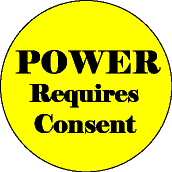 Politics is as often at the heart of selling out. Power requires consent, the consent of the people. This is the foundation for nonviolent resistance and noncooperation with evils in society. Fortunately, the malleable morality of politicians can be harnessed by the exercise of power directly by the people, without relying on simply moral appeals. In the body politic, the moral state of the state is mediated by the people either exercising their values which manifest political realities and shape power, or by the people delegating moral behavior to politicians (sic) and/or relinquishing morality altogether. The people define the political realities by which politicians must navigate. The pragmatic malleability of politicians makes them far better suited to follow than lead, to reflect current political realities rather than challenge and change them. The notion that power is fundamentally derived from political elites is mistaken and not what the founders of the constitution understood of governance as derived from the consent of the people. Likewise, moral behavior is derived from each person as a moral agent, a responsibility that cannot be relinquished and a privilege that each human shares.
Politics is as often at the heart of selling out. Power requires consent, the consent of the people. This is the foundation for nonviolent resistance and noncooperation with evils in society. Fortunately, the malleable morality of politicians can be harnessed by the exercise of power directly by the people, without relying on simply moral appeals. In the body politic, the moral state of the state is mediated by the people either exercising their values which manifest political realities and shape power, or by the people delegating moral behavior to politicians (sic) and/or relinquishing morality altogether. The people define the political realities by which politicians must navigate. The pragmatic malleability of politicians makes them far better suited to follow than lead, to reflect current political realities rather than challenge and change them. The notion that power is fundamentally derived from political elites is mistaken and not what the founders of the constitution understood of governance as derived from the consent of the people. Likewise, moral behavior is derived from each person as a moral agent, a responsibility that cannot be relinquished and a privilege that each human shares.
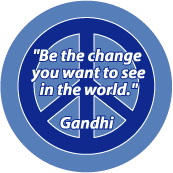 Authentic leadership, by being the change you want to see in the world, is often punished by the powers that be of the status quo, whose interest is in maintaining things the way they are, that is, to their own advantage over others. Your resistance and its equal and opposite force applied by the powers that be is exactly the measure by which your values are valued.
Authentic leadership, by being the change you want to see in the world, is often punished by the powers that be of the status quo, whose interest is in maintaining things the way they are, that is, to their own advantage over others. Your resistance and its equal and opposite force applied by the powers that be is exactly the measure by which your values are valued. 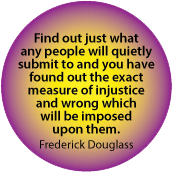 More simply put, your values are values exactly to the extent that you are willing to pay a price for them. Many good things in life come cheap, either through the work of others or the grace of God. The luck of the draw in possessing such good things that come to us without us personally paying the full cost is what is often called privilege. Good things are, well, good. But, when we haven’t paid the full cost, or worse yet, someone else is involuntarily paying the cost for you, such an imbalance in the balance sheet requires moral action to assure fair treatment of others. It is exactly such imbalances in the balance sheets that fundamentally amoral ideologies such as capitalism cannot produce balance. In fact, amoral ideologies such as capitalism act to leverage inequalities and unfairness into further inequalities and unfairness. In short, it takes moral force, truth force, what Gandhi referred to as satyagraha, to set the world right. Those experiencing the short end of inequalities and unfairness most fully experience the material conditions suited to such enlightenment. Those experiencing the long end of inequalities and unfairness find that their the material conditions are rife with easy denial and low-cost rationalizations suited to maintaining their advantage, their advantage over others. This is another way of describing the “preferential option for the poor” in liberation theology, recognizing that the dispossessed are naturally better positioned to exercise moral leadership since their personal interests and social justice interests are better aligned. Surely, the poor have their own special set of temptations to choose the low road in morality. However, the privileged are only required to give up privilege over others for justice’s sake, which is a nominal sacrifice compared to coping well or poorly inside chronic injustices. This is particularly true since the powers that be exact a price disproportionately higher to the dispossessed than what would represent a fair price for their personal, individual justice. In other words, the dispossessed must invest in social justice to experience personal justice.
More simply put, your values are values exactly to the extent that you are willing to pay a price for them. Many good things in life come cheap, either through the work of others or the grace of God. The luck of the draw in possessing such good things that come to us without us personally paying the full cost is what is often called privilege. Good things are, well, good. But, when we haven’t paid the full cost, or worse yet, someone else is involuntarily paying the cost for you, such an imbalance in the balance sheet requires moral action to assure fair treatment of others. It is exactly such imbalances in the balance sheets that fundamentally amoral ideologies such as capitalism cannot produce balance. In fact, amoral ideologies such as capitalism act to leverage inequalities and unfairness into further inequalities and unfairness. In short, it takes moral force, truth force, what Gandhi referred to as satyagraha, to set the world right. Those experiencing the short end of inequalities and unfairness most fully experience the material conditions suited to such enlightenment. Those experiencing the long end of inequalities and unfairness find that their the material conditions are rife with easy denial and low-cost rationalizations suited to maintaining their advantage, their advantage over others. This is another way of describing the “preferential option for the poor” in liberation theology, recognizing that the dispossessed are naturally better positioned to exercise moral leadership since their personal interests and social justice interests are better aligned. Surely, the poor have their own special set of temptations to choose the low road in morality. However, the privileged are only required to give up privilege over others for justice’s sake, which is a nominal sacrifice compared to coping well or poorly inside chronic injustices. This is particularly true since the powers that be exact a price disproportionately higher to the dispossessed than what would represent a fair price for their personal, individual justice. In other words, the dispossessed must invest in social justice to experience personal justice. 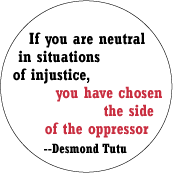 The privileged are free of such costs, and worse yet, are personally advantaged by injustice, a cruel incentive to unjust action, or more often than not, inaction.
The privileged are free of such costs, and worse yet, are personally advantaged by injustice, a cruel incentive to unjust action, or more often than not, inaction.
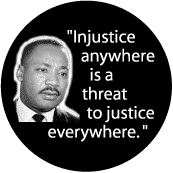 As can be seen through the lenses of power derived through the consent of the people and the material conditions conducive to acting morally in the face of social injustices, the hope for a more just and moral world is founded in actions of solidarity with and among the disenfranchised of the world. Expecting the privileged to relinquish their privilege — or manage the poor justly (sic) — is a lame substitute for disenfranchised peoples acting in the interest of both themselves and all people. May we act in solidarity with one another to overturn injustice anywhere.
As can be seen through the lenses of power derived through the consent of the people and the material conditions conducive to acting morally in the face of social injustices, the hope for a more just and moral world is founded in actions of solidarity with and among the disenfranchised of the world. Expecting the privileged to relinquish their privilege — or manage the poor justly (sic) — is a lame substitute for disenfranchised peoples acting in the interest of both themselves and all people. May we act in solidarity with one another to overturn injustice anywhere.
Feel free to browse Top Pun’s designs about social justice and a huge choice of political action issues.


